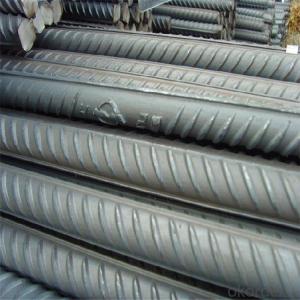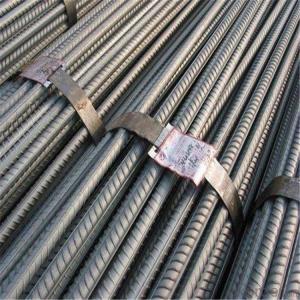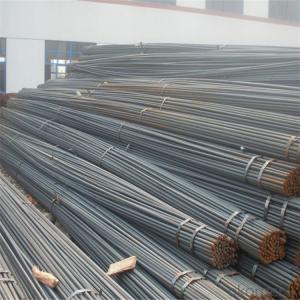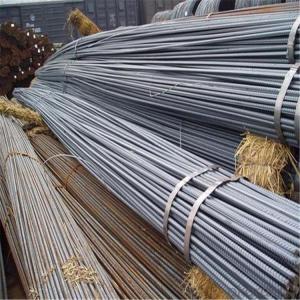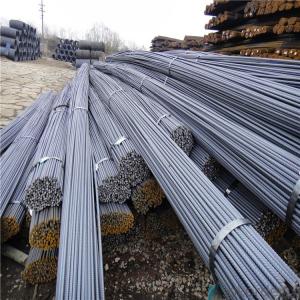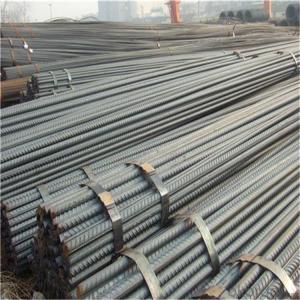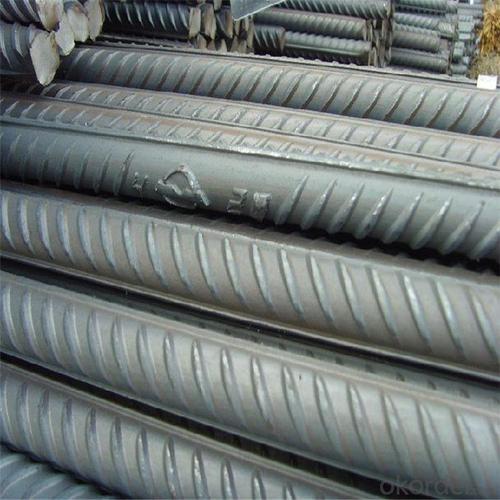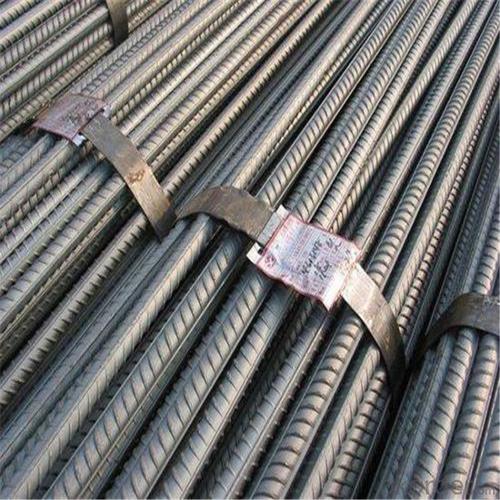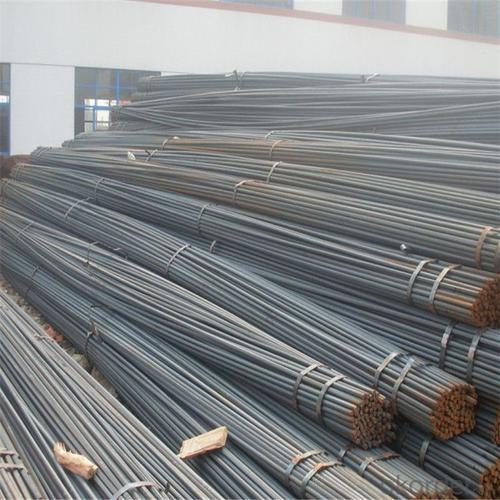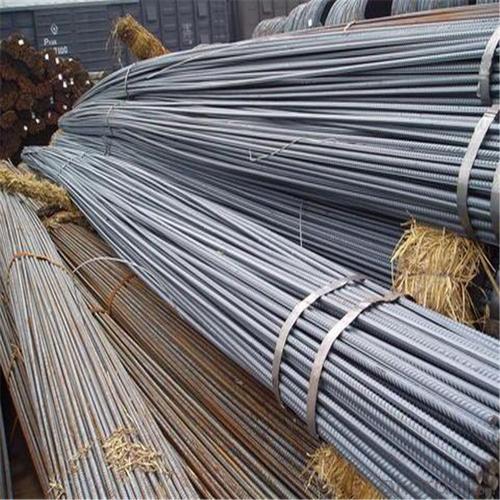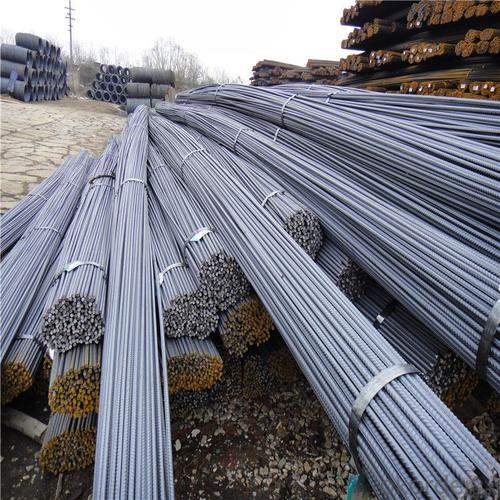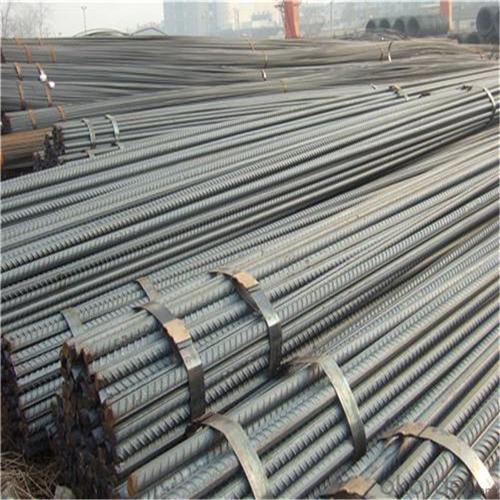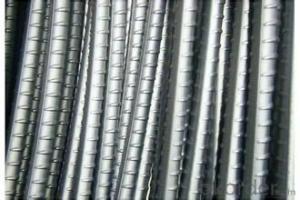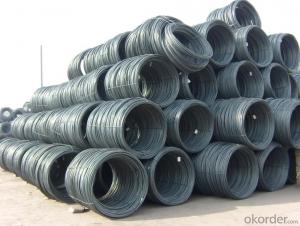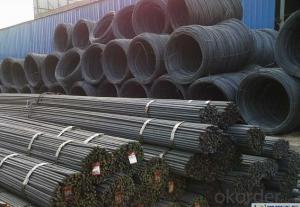High Tensile Deformed Steel Bar
- Loading Port:
- Tianjin
- Payment Terms:
- TT OR LC
- Min Order Qty:
- 140 m.t.
- Supply Capability:
- 50000 m.t./month
OKorder Service Pledge
OKorder Financial Service
You Might Also Like
Specification
High Tensile Deformed Steel Bar
Description of High Tensile Deformed Steel Bar
1, Diameter: 5.5mm-10mm High Tensile Deformed Steel Bar
10m- 40mm High Tensile Deformed Steel Bar
2, Length: 6m, 9m, 12m or customized
3, Standard: GB, ASTM, AISI, SAE, DIN, JIS, EN
2, Produce Process:
hot rolled or forged to get the steel round bar and plate
3, Heat Treatment: annealing, normalizing, tempering, quenching
4, Surface Treatment: Black
5, Quality Assurance: You can ask testing organizations such as SGS, BV, etc. to test our products before shipping.
Chemical Composition of High Tensile Deformed Steel Bar
Grade | Technical data of the original chemical composition(%) | |||||
Reinforcing steel bar HRB335 | C | Mn | Si | S | P | B |
≤0.25 | ≤1.60 | ≤0.80 | ≤0.045 | ≤0.045 | >0.0008 | |
Physics Capability | ||||||
Yield Strength(N/cm2) | Tensile Strength(N/cm2) | Elongation(%) | ||||
≥ 335 | ≥490 | ≥16 | ||||
Reinforcing steel bar HRB400 | C | Mn | Si | S | P | B |
≤0.25 | ≤0.16 | ≤0.80 | ≤0.045 | ≤0.045 | 0.04-0.12 | |
Physics Capability | ||||||
Yield Strength(N/cm2) | Tensile Strength(N/cm2) | Elongation(%) | ||||
≥ 400 | ≥ 570 | ≥ 14 | ||||
Products Show of High Tensile Deformed Steel Bar
Company Information
CNBM International Corporation is the most important trading platform of CNBM group.
Whith its advantages, CNBM International are mainly concentrate on Cement, Glass, Iron and Steel, Ceramics industries and devotes herself for supplying high qulity series of refractories as well as technical consultancies and logistics solutions.


F A Q
1, Your advantages?
professional products inquiry, products knowledge train (for agents), smooth goods delivery, excellent customer solution proposale
2, Test & Certificate?
SGS test is available, customer inspection before shipping is welcome, third party inspection is no problem
3, Factory or Trading Company?
CNBM is a trading company but we have so many protocol factories and CNBM works as a trading department of these factories. Also CNBM is the holding company of many factories.
4, Payment Terms?
30% TT as deposit and 70% before delivery.
Irrevocable L/C at sight.
5, Trading Terms?
EXW, FOB, CIF, FFR, CNF
6, After-sale Service?
CNBM provides the services and support you need for every step of our cooperation. We're the business partner you can trust.
For any problem, please kindly contact us at any your convenient time.
We'll reply you in our first priority within 24 hours.
- Q: How is shock-resistant alloy steel used in the production of impact-resistant parts?
- Shock-resistant alloy steel is used in the production of impact-resistant parts to enhance their durability and toughness. This type of steel is specifically designed to withstand high impact forces, making it ideal for applications where parts are subjected to intense shock or sudden impact loads. By incorporating shock-resistant alloy steel into the manufacturing process, impact-resistant parts can better absorb and distribute the energy from impacts, thereby reducing the risk of damage or failure.
- Q: What are the main advantages of using special steel in the aerospace industry?
- The main advantages of using special steel in the aerospace industry include its high strength-to-weight ratio, excellent fatigue resistance, and good corrosion resistance. Special steel can withstand extreme temperatures and pressures, making it ideal for critical components like aircraft engines and landing gear. Additionally, its superior mechanical properties and reliability contribute to improved safety and performance in aerospace applications.
- Q: How is special steel used in the manufacturing of bearings?
- Special steel is used in the manufacturing of bearings due to its high strength, durability, and resistance to wear and corrosion. This type of steel is specifically designed to withstand the demanding conditions and loads that bearings are subjected to. It is used to create the inner and outer rings, as well as the rolling elements, of the bearing, ensuring smooth operation and increased lifespan.
- Q: What are the different methods of preventing hydrogen embrittlement in special steel?
- There are several methods that can be employed to prevent hydrogen embrittlement in special steel. 1. Proper material selection: Choosing the right type of steel with a lower susceptibility to hydrogen embrittlement can be an effective preventive measure. Steels with high strength and hardness are generally more susceptible to embrittlement, so opting for steels with lower alloy content or different composition can be beneficial. 2. Controlled heat treatment: Proper heat treatment processes can help reduce the risk of hydrogen embrittlement. Tempering and annealing at specific temperatures can relieve internal stresses and minimize the impact of hydrogen absorption. 3. Hydrogen mitigation techniques: Various techniques can be utilized to prevent or reduce the amount of hydrogen in the steel. These include preheating the steel before exposure to hydrogen, utilizing desorption methods such as vacuum annealing to remove trapped hydrogen, and employing hydrogen scavenger coatings or inhibitors that capture or neutralize the hydrogen. 4. Stress reduction: High levels of stress can increase the likelihood of hydrogen embrittlement. Implementing stress relief techniques such as shot peening or stress-relieving heat treatments can help reduce the potential for embrittlement. 5. Proper handling and storage: Hydrogen embrittlement can also occur during the manufacturing, handling, or storage stages. It is essential to ensure that the steel is protected from exposure to hydrogen-rich environments, such as during cleaning or pickling processes. Proper packaging and storage techniques, including the use of dry environments or protective coatings, can also help prevent hydrogen absorption. 6. Maintenance and inspection: Regular inspection and maintenance of the steel components can help identify any signs of hydrogen embrittlement at an early stage. This allows for timely repairs or replacements to prevent catastrophic failures. It is important to note that the specific method or combination of methods employed to prevent hydrogen embrittlement may vary depending on the specific application, the type of steel, and the environmental conditions it will be exposed to. Therefore, it is crucial to consult with experts and adhere to industry standards and guidelines to ensure effective prevention of hydrogen embrittlement in special steel.
- Q: What are the requirements for special steel used in corrosive environments?
- To ensure durability and performance in corrosive environments, special steels must possess specific properties. The requirements for these steels can be summarized as follows: 1. Excellent corrosion resistance is the primary requirement. The steels should be able to withstand aggressive substances like acids, alkalis, and salts without showing signs of corrosion. This ensures the longevity of the steel and maintains its performance. 2. High strength is crucial for handling mechanical stresses imposed on the steel in corrosive environments. It is particularly important for applications with heavy loads, pressures, or impacts, as it helps maintain the steel's integrity and structural stability. 3. Resistance to pitting and crevice corrosion is essential. These localized forms of corrosion can occur in the presence of certain aggressive chemicals or stagnant environments. Steels should be resistant to such forms of corrosion to prevent localized damage and potential failure. 4. Resistance to stress corrosion cracking is necessary. This phenomenon occurs when a corrosive environment compromises the material's integrity under tensile stress. Special steels should be resistant to stress corrosion cracking to ensure reliability under applied loads. 5. Good resistance to intergranular corrosion is important. This type of corrosion along grain boundaries weakens the material. Special steels used in corrosive environments should have resistance to intergranular corrosion to maintain structural integrity. 6. Thermal stability is essential for high-temperature corrosive environments. Special steels should exhibit thermal stability to resist degradation and maintain their properties in elevated temperatures. 7. Ease of maintenance is a desirable characteristic. Special steels used in corrosive environments should be relatively easy to clean, resistant to fouling or scaling, and compatible with commonly used cleaning agents or procedures in the industry. It is important to note that the specific requirements for special steels in corrosive environments may vary depending on the application and type of corrosive substances encountered. Therefore, careful consideration of specific needs and consultation with experts in the field is crucial for selecting the most appropriate steel for each corrosive environment.
- Q: What are the different corrosion-resistant grades of special steel?
- Some of the different corrosion-resistant grades of special steel include stainless steel grades such as 304, 316, and 2205, as well as nickel-based alloys like Inconel and Hastelloy. These grades are specifically designed to resist corrosion in various environments and applications.
- Q: What are the different methods of preventing galvanic corrosion in special steel?
- There are several methods of preventing galvanic corrosion in special steel. Some common approaches include using protective coatings or barriers such as paints, varnishes, or corrosion-resistant alloys. Another method is cathodic protection, where a sacrificial anode is connected to the steel to attract corrosion instead. Additionally, controlling the environment by reducing moisture or adding inhibitors can also help prevent galvanic corrosion in special steel.
- Q: How does special steel contribute to reducing energy consumption?
- Special steel contributes to reducing energy consumption in several ways. Firstly, special steel is known for its high strength and durability, allowing it to be used in the construction of lightweight structures. This helps in reducing the overall weight of vehicles, machinery, and buildings, resulting in lower energy requirements for their operation and transportation. Additionally, special steel is used in the manufacturing of energy-efficient appliances and equipment, such as turbines and generators, which optimize energy conversion and minimize energy losses. Furthermore, special steel is often used in the production of renewable energy systems like wind turbines and solar panels, enabling the efficient generation of clean energy. Overall, the unique properties of special steel help in achieving energy efficiency goals and promoting sustainable practices.
- Q: How does the heat treatment process affect special steel?
- The heat treatment process greatly affects special steel by altering its microstructure, improving its mechanical properties, and enhancing its overall performance. The process involves heating the steel to a specific temperature and then cooling it at a controlled rate. This changes the steel's internal structure, making it stronger, more durable, and resistant to wear and corrosion. Additionally, heat treatment can modify the steel's hardness, toughness, and flexibility, making it suitable for specific applications such as cutting tools, automotive parts, or aerospace components.
- Q: What are the main factors affecting the fracture toughness of special steel?
- The fracture toughness of special steel is influenced by several main factors. 1. Alloy composition: The specific chemical composition of the steel, including the type and amount of alloying elements, greatly affects its fracture toughness. Elements like chromium, nickel, and molybdenum can improve the toughness by promoting the formation of fine-grained microstructures or enhancing the steel's ability to resist crack propagation. 2. Heat treatment: The heat treatment process, including the temperature and duration of heating and cooling, plays a crucial role in determining the fracture toughness. Proper heat treatment can refine the microstructure and eliminate potential defects, enhancing the steel's resistance to fracture. 3. Microstructure: The microstructure of the steel, such as grain size and distribution, phase composition, and presence of inclusions, significantly affects its fracture toughness. Fine-grained structures generally exhibit higher toughness due to improved resistance to crack propagation. 4. Presence of defects: The presence of defects like cracks, voids, or inclusions in the steel can act as stress concentrators, reducing its fracture toughness. These defects can initiate cracks and propagate them more easily, leading to lower toughness. 5. Temperature: Fracture toughness is temperature-dependent, and the behavior of special steel can vary significantly at different temperatures. Some steels exhibit improved toughness at low temperatures due to the transformation of the microstructure, while others may experience reduced toughness at elevated temperatures due to the softening of the material. 6. Loading conditions: The fracture toughness of special steel can also be influenced by the loading conditions, such as the rate of loading or the presence of dynamic loading. Higher loading rates or dynamic loading can result in reduced toughness as the steel may not have sufficient time to deform and absorb energy before fracture. 7. Mechanical properties: The mechanical properties of the steel, such as strength, hardness, and ductility, can affect its fracture toughness. Higher strength and hardness can sometimes lead to lower toughness, as the material becomes more brittle. However, a balance between strength and toughness can be achieved by carefully selecting the alloy composition and heat treatment parameters. Overall, the fracture toughness of special steel is a complex interplay of various factors, including alloy composition, heat treatment, microstructure, defects, temperature, loading conditions, and mechanical properties. Optimizing these factors can help enhance the fracture toughness of special steel for specific applications.
Send your message to us
High Tensile Deformed Steel Bar
- Loading Port:
- Tianjin
- Payment Terms:
- TT OR LC
- Min Order Qty:
- 140 m.t.
- Supply Capability:
- 50000 m.t./month
OKorder Service Pledge
OKorder Financial Service
Similar products
Hot products
Hot Searches
Related keywords
